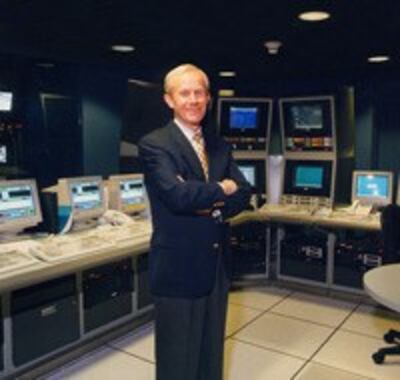
WASHINGTON, July 19, 2005 (RFA)—Veteran journalist Richard Richter retired on July 29 as founding president of Radio Free Asia (RFA) after more than a half-century in print, broadcast, and electronic media.
The bipartisan Broadcasting Board of Governors (BBG) chose Richter, a longtime executive producer with ABC, CBS, and PBS television, to launch RFA in 1996, shortly after the U.S. Congress authorized its creation as a “surrogate” broadcaster providing news and information to those East Asian countries that lack free media.
“Few people in the history of international broadcasting have served with the intellectual honesty and the essential decency as Dick Richter,” BBG Chairman Kenneth Y. Tomlinson said in a statement. “He is a good man, and he has been a terrific leader. Journalistic excellence has been the hallmark of Radio Free Asia under Dick Richter.”
Award-winning news content
Few people in the history of international broadcasting have served with the intellectual honesty and the essential decency as Dick Richter. He is a good man, and he has been a terrific leader. Journalistic excellence has been the hallmark of Radio Free Asia under Dick Richter.
Under Richter’s leadership, RFA has launched and continues to expand round-the-clock, award-winning news broadcasts to the closed countries of East Asia in Burmese, Cantonese, Khmer, Korean, Lao, Mandarin, Shanghaiese, Tibetan, Uyghur, and Vietnamese. Also under his leadership, RFA maintains an award-winning Web site in nine languages at www.rfa.org, as well as a number of toll-free caller hotlines that reach listeners in Mandarin, Cantonese, Khmer, Tibetan, and Uyghur.
“For all my years in the news business, I have felt a great sense of responsibility to deliver information and to get it right—to use my privileged position as a journalist to enrich readers, viewers, and listeners,” Richter said. “But my time at RFA has been the most fulfilling—to hear from listeners that RFA is ‘a lighthouse and a beacon of hope,’ that our broadcasts are like ‘the drinking water of life or a spirit of freedom.’ What could be better than that?”
“Initially, repressive governments reviled RFA, because we were letting people know what was going on in their own countries—providing information that their own leaders would suppress. Other news organizations were skeptical too, but not anymore, because time after time RFA has managed to break news that no one else had. Now we’re recognized as an exceptional source of accurate news about Asia.”
RFA reporters broadcast to their homelands using their native languages and dialects, he said, and knowing that they are reaching “people starved for honest, responsible news.”
Positive listener feedback
Listener feedback has been overwhelmingly positive, Richter said, citing a recent caller from China’s Jiangxi Province who said: “I love you, Radio Free Asia. You have given me the courage of life [and] brought hope to the future of China…[You] have taught me the true value of life.”
Richter also cited a recent letter from a North Korean man hiding in China who wrote: “For those who can ask no help… RFA is a lifeline…I have informed other defectors about your radio and urged them to listen. I tell these refugees to lie low, hold onto their hopes, be patient, and listen to RFA."
The BBG has named RFA’s Vice President for Administration and Finance, Libby Liu, as acting president of the corporation, effective Aug. 1, pending final selection of a new president.
An award-winning media career
Before founding RFA, Richter worked for 25 years at ABC News and CBS News as a producer, senior producer, and executive producer for news and documentaries.
At ABC Evening News, Richter served as executive producer and was a founding senior producer of “Good Morning America.” As senior producer of the ABC News Close-up series, he worked on 64 documentaries that won virtually every major national and international award.
Richter worked as executive producer for the Public Broadcast Laboratory, a two-year experiment in public television, which preceded the creation of PBS, before joining ABC.
From 1989-94, Richter was at Washington, DC PBS affiliate WETA as executive producer of news and public affairs. He managed production of “Washington Week in Review,” news specials, and other documentary programs and series for broadcast on PBS.
Richter began his career as a reporter for Newsday and went on to work as a writer and editor for The New York World-Telegram and The Sun. He received a B.A. in English from Queens College in New York. He also was the recipient of the CBS News Fellowship at Columbia University for the study of African affairs, and from 1963-67 he served on the Peace Corps staff in Washington and Kenya.
